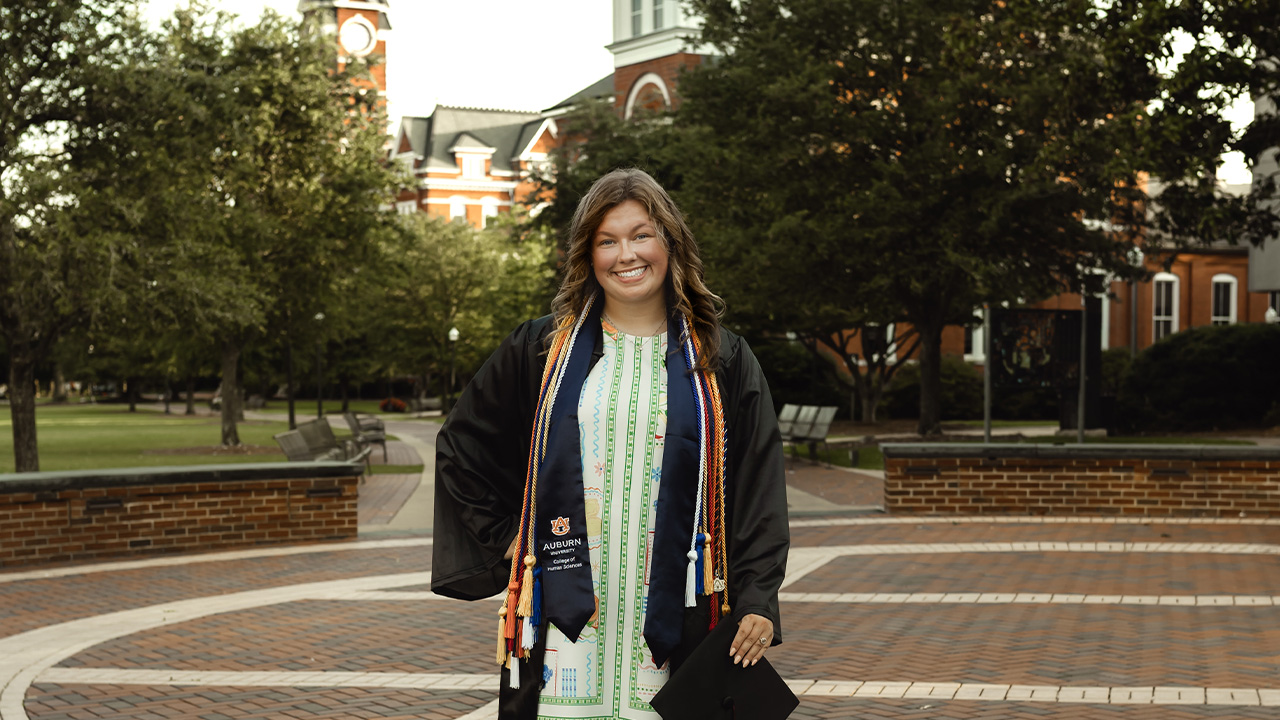content body
Having moved a dozen times in her life, Anabel Dillingham never really had a “hometown,” that is, until she started attending Auburn.
“I’ve always defined ‘home’ as wherever my family is, but Auburn has truly become my own version of home,” she said. “It’s where I’ve grown, thrived and found a community that feels like family. Auburn welcomed me with open arms, and now, it’s where I hope to plant roots and give back to the place that’s given me so much.”
Dillingham will graduate in August with a bachelor’s degree in hospitality management, culinary science option, from the College of Human Sciences. Just one week later, she’ll start Auburn’s Master of Science in Hospitality Management program, focusing on sustainability and food science. She’s hoping to eventually earn a doctorate on the Plains.
“I’m hoping to stay for the doctoral program and study global gastronomy to further my knowledge, not only in culinary science but also in sustainable practices,” she said. “Eventually, I want to teach in a culinary institute or become a professor here.”

A week after graduating, Dillingham will start Auburn’s Master of Science in Hospitality Management program.
An early start
Though her military family was always on the move, there was one constant in Dillingham’s life: her love of cooking. Even as a toddler, she turned the family kitchen into a full-scale bakery or café, and her love of business inspired her to create menus, business cards and logos.
“My mom was always my most loyal customer, and I’d plate up plastic pastries or real desserts with as much flair as I could manage,” Dillingham said. “I was creating an experience — even then, I knew hospitality was about more than food; it was about the way you make someone feel. That mindset has never left me.”
As Dillingham entered her teenage years, she started baking custom cakes, cookies and homemade brownies and selling them to customers. The make-believe play that became real had set her up for a career in the culinary arts by teaching her patience, precision and creativity.
“All those little storefronts I created back then planted the seed for the business I hope to open one day,” she said. “I’ve always been a dreamer. That part hasn’t changed, but the dreams have definitely grown bigger and bolder.”
Looking back on her past four years on campus, Dillingham, who received a number of scholarships that made her Auburn experience possible, appreciates the knowledge she’s gained about different types of cuisines from around the world. And while she feels her expertise lies in making cakes and soufflés, she also likes trying new recipes.
“I’m more pastry-focused, but honestly, my favorite things might be the ones I’ve never made before, just because I enjoy the process so much,” she said.
Incorporating new ideas
In addition to learning about various types of cuisines and pastries, Dillingham has developed an interest in sustainable cooking practices, including composting, waste reduction and a circular food system. Part of that cycle is sharing extras with others, and as a Campus Kitchen volunteer, Dillingham has been able to see firsthand how the large portions culinary students make in labs can be shared with those who benefit from it.
“In our global gastronomy class, we make 32 portions a week, and for our final, we make 125 portions per group,” she said. “I think it’s such a privilege to take all this food from the labs and repackage it for Campus Kitchen to share. It’s a really important program to support because one in three students at Auburn face food insecurity.”
As a graduate student, Dillingham plans to continue her work with Campus Kitchen while also growing her knowledge about reducing food waste, promoting seasonal and local sourcing of ingredients and, of course, creating the perfect pastry. She’ll also keep trying new recipes and sharing them with friends and family.
“I think it’s really special to share with people not just foods you enjoy, but foods you want them to enjoy,” she said. “I think sharing joy with others through food is one of the most basic human interactions you can have.”






